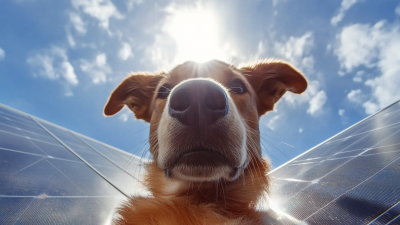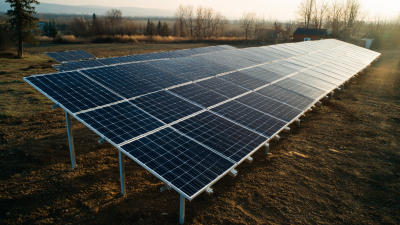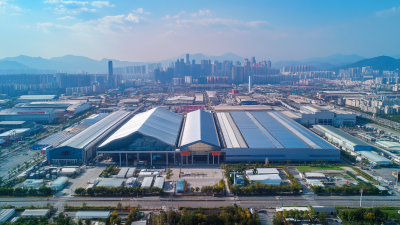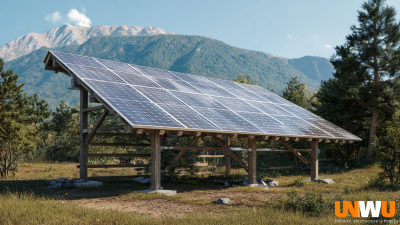Tel : 94870 36000, 94860 36000, 94890 36000
7 Essential Tips for Maximizing Your Off Grid Solar Power Systems
In recent years, the adoption of Off Grid Solar Power systems has surged, driven by technological advancements and a growing desire for energy independence. According to a report by the International Renewable Energy Agency (IRENA), the global off-grid solar market is expected to reach over 2.5 billion USD by 2025, as more households and businesses seek sustainable energy solutions away from conventional grid dependence. This growing trend underscores the importance of efficiently harnessing solar energy, particularly in remote areas where access to traditional power sources is limited or nonexistent. By implementing effective strategies, users can optimize their off grid solar systems, ensuring both cost-effectiveness and reliability. In this blog, we will explore seven essential tips that can help maximize your off grid solar power systems, allowing you to enjoy the benefits of renewable energy like never before.

Table of Contents
[Hide]
Understanding Off-Grid Solar Power Systems: Key Components and Functions
Off-grid solar power systems are designed to provide energy independence and sustainability for users in remote locations. These systems typically consist of essential components such as solar panels, charge controllers, batteries, and inverters. According to the U.S. Department of Energy, the adoption of off-grid solar systems has increased significantly, with a 20% rise in installations from 2021 to 2022, driven by advancements in technology and decreasing costs in solar energy equipment.

To maximize the efficiency of your off-grid solar power system, consider the placement of your solar panels. Aiming for south-facing installation with an optimal tilt can significantly enhance energy capture. Additionally, maintaining your batteries is crucial; regular monitoring and proper charging cycles can extend their life, a fact supported by a report from the National Renewable Energy Laboratory indicating that proper battery maintenance can improve longevity by up to 30%.
Finally, evaluate your energy needs accurately. Many users overestimate their requirements, leading to unnecessary expenses. Conducting a detailed energy audit can help tailor your system to fit actual usage, ensuring optimal performance and cost-effectiveness. Embracing these strategies will not only improve your system's reliability but also contribute to a more sustainable lifestyle.
Choosing the Right Solar Panels: Efficiency Ratings and Lifespan Considerations
When selecting solar panels for your off-grid system, efficiency ratings and lifespan are paramount considerations. According to the National Renewable Energy Laboratory (NREL), the efficiency of solar panels can typically range from 15% to over 22%. Higher efficiency panels, while initially more expensive, produce more energy in a limited space, making them a smart choice for off-grid applications where real estate may be restricted. Investing in high-efficiency panels can lead to greater energy yields over time, compensating for the higher upfront costs.
Additionally, lifespan is a critical factor. Most solar panels come with a warranty of 25 years, but many can function well beyond this period with minimal degradation. The NREL also notes that high-quality monocrystalline panels can maintain around 80% of their efficiency even after 25 years. As technology advances, choosing panels with a longer lifespan and higher efficiency ratings can ensure your off-grid solar power system remains robust and productive, ultimately reducing your energy costs and reliance on alternative power sources.
Battery Storage Solutions: Optimizing Energy Use and Lifespan in Off-Grid Systems
When exploring battery storage solutions for off-grid solar power systems, optimizing energy use and prolonging battery lifespan are key considerations. According to the National Renewable Energy Laboratory, effective energy management can enhance battery efficiency by as much as 30%. This emphasizes the importance of selecting the right battery technology, with lithium-ion batteries often favored for their longer cycle life and better energy density compared to lead-acid counterparts.

Tip One: Regular maintenance is critical. Ensuring battery terminals are clean and checking for corrosion can prevent inefficiencies. Monitoring the state of charge (SOC) and depth of discharge (DOD) is essential; maintaining a DOD of 50% or less can significantly extend the life of your batteries.
Tip Two: Implement a smart storage system. Utilizing advanced energy management systems can help users make real-time decisions about energy consumption, automatically balancing the load and optimizing the use of stored energy. Research indicates that smart systems can lead to a reduction of energy waste by over 25%, resulting in not just savings but also better sustainability for off-grid lifestyles.
By focusing on these strategies, users can maximize their off-grid solar systems, ensuring both efficient energy use and longevity for their battery storage solutions.
Inverter Types and Their Role in Off-Grid Solar Power Efficiency
When it comes to off-grid solar power systems, the inverter is a critical component that plays a vital role in overall efficiency. In essence, the inverter converts the direct current (DC) generated by solar panels into alternating current (AC), which is the type of electricity most household appliances require. Understanding the different types of inverters available, such as pure sine wave, modified sine wave, and grid-tie inverters, can significantly impact the performance and reliability of your solar setup.
Pure sine wave inverters are typically the best choice for off-grid applications as they produce a clean and stable power output, closely mimicking the electricity supplied by the grid. This makes them ideal for sensitive electronics and appliances that demand consistent power quality. On the other hand, modified sine wave inverters, while more affordable, may not be suitable for all devices and can lead to inefficiency in operation. Additionally, choosing the right inverter size is essential; an undersized inverter can struggle to handle peak loads, while an oversized one can lead to energy wastage. By selecting the appropriate inverter type and sizing, you can greatly enhance the efficiency of your off-grid solar power system.
Energy Production Analysis of Off-Grid Solar Power Systems
Maintenance Tips: Ensuring Longevity and Performance of Your Solar Power Setup
Maintaining your off-grid solar power system is crucial for ensuring its longevity and optimal performance. According to a report by the National Renewable Energy Laboratory (NREL), regular maintenance can increase the lifespan of solar panels by up to 25%, while poorly maintained systems may experience a reduction in efficiency by as much as 30%. To prevent such losses, it’s essential to establish a routine that includes cleaning your solar panels at least twice a year. Dust, dirt, and debris can significantly impede light absorption, leading to decreased energy output.
Moreover, checking all electrical connections and system components is vital. The Solar Energy Industries Association (SEIA) emphasizes that loose connections or corroded wires can lead to system failures or fires. Conducting annual inspections can help identify issues early and prevent costly repairs. It's also advisable to monitor your system's performance regularly using digital monitoring tools. By keeping track of energy production levels, you can promptly detect any drop in performance and take corrective actions, ensuring that your off-grid solar system remains effective and efficient for years to come.
Related Posts
-

Top 10 Solar Panel Solutions from Chinese Manufacturers at the 137th Canton Fair
-

Unlocking Success: Essential Tips for Sourcing Premium Best Home Solar Suppliers Globally
-

Exploring Diverse Alternatives in Solar Panels Solutions for Global Buyers
-

Unlocking Global Opportunities at the 2025 Canton Fair for Inverter Solar Solutions
-

Overcoming Challenges in Solar Panel Solutions: What You Need to Know
-

Exploring Innovative Alternatives to Best Solar Panel Off Grid System Solutions

